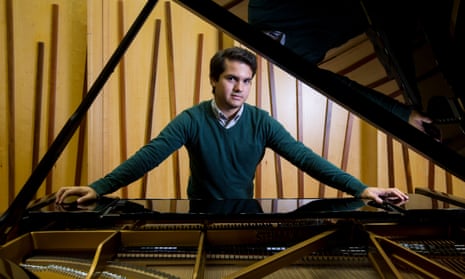I was 11 years old when I asked my mum for piano lessons, in 2010. We were in the fallout of the recession and she’d recently been made redundant. She said a polite “no”.
That didn’t deter me. I Googled the dimensions of a keyboard, drew the keys on to a piece of paper and stuck it on my desk. I would click notes on an online keyboard and “play” them back on my paper one – keeping the sound they made on the computer in my head. After a while I could hear the notes in my head while pressing the keys on the paper. I spent six months playing scales and chord sequences without touching a real piano. Once my mum saw it wasn’t a fad, she borrowed some money from family and friends, and bought me 10 lessons.
I still remember the first one. I was struck by how organic the sound of the piano was, as I had become familiar with the artificial electronic sound. The teacher tried to explain where middle C was but I could already play all the major and minor scales, as well as tonic and dominant functions, and the circle of fifths.
I sat my grade one after eight lessons and got distinction. By the time I started secondary school, we couldn’t afford lessons again, so I returned to my paper keyboard. I passed grade three, then grade five, practising only on my piece of paper.
For the grades above that, there’s an expectation that you incorporate a certain sensitivity into your playing. The head of music at my school said I could practise on the school’s grand piano. I would wake up at 5.30am to get there in time and play until lessons started. I’d forgo lunch and then practise after school until the caretaker kicked me out. At home, I’d have dinner, do three hours of revision, then mental practice until 1am.
One evening, when I was about 13, I came home and my mum said she had a surprise for me; I was expecting a chocolate orange, but it was an electronic keyboard, bought with more money borrowed from friends. It was the first time I’d played for her. She was expecting to hear Baa Baa Black Sheep but I played a piece called Elegy: In Autumn; she was in shock.
My dad was very much against me playing. He wanted me to study medicine, and saw my pursuit of music as turning down a lucrative career. That hardened my resolve to keep playing, as the piano offered an escape from an unhappy home life.
My school didn’t offer music A-level. I found the Purcell School for young musicians in Hertfordshire, but it cost £30,000 a year. My head of music discovered that I could pay only £1,000 by applying for a means-tested bursary.
The audition was gruelling; I was used to analysing piano pieces but here I was confronted with a full orchestral score. Some of the questions involved an estimation of the composer or the year it was written. I felt overwhelmed.
Others at the audition had flown in from all over, including someone who had made their concerto debut at nine years old. To my amazement I was offered a place.
At Purcell, I spent two years working as hard as I could. I performed recitals to raise money and saved enough to buy my first piano.
I had been told I had started playing too late to reach conservatoire level, but when I Ieft Purcell, I was awarded the senior piano prize and senior academic music prize. That was the point when I realised I wasn’t behind everyone else. I am now at the Guildhall school in London, where I was offered a scholarship. I feel proud: it’s been 10 years since I drew my paper piano and I’m at one of the world’s leading conservatoires.
The irony is that I continue to do a lot of my practice away from the piano: what we call mental practice. It unlocks key areas of the mind that are less readily accessed by piano playing alone. The paper piano helped spark my curiosity about how music works, the building blocks that form the pieces. I try to inspire that same curiosity in my own students.
As told to Beena Nadeem
Do you have an experience to share? Email experience@theguardian.com

Comments (…)
Sign in or create your Guardian account to join the discussion